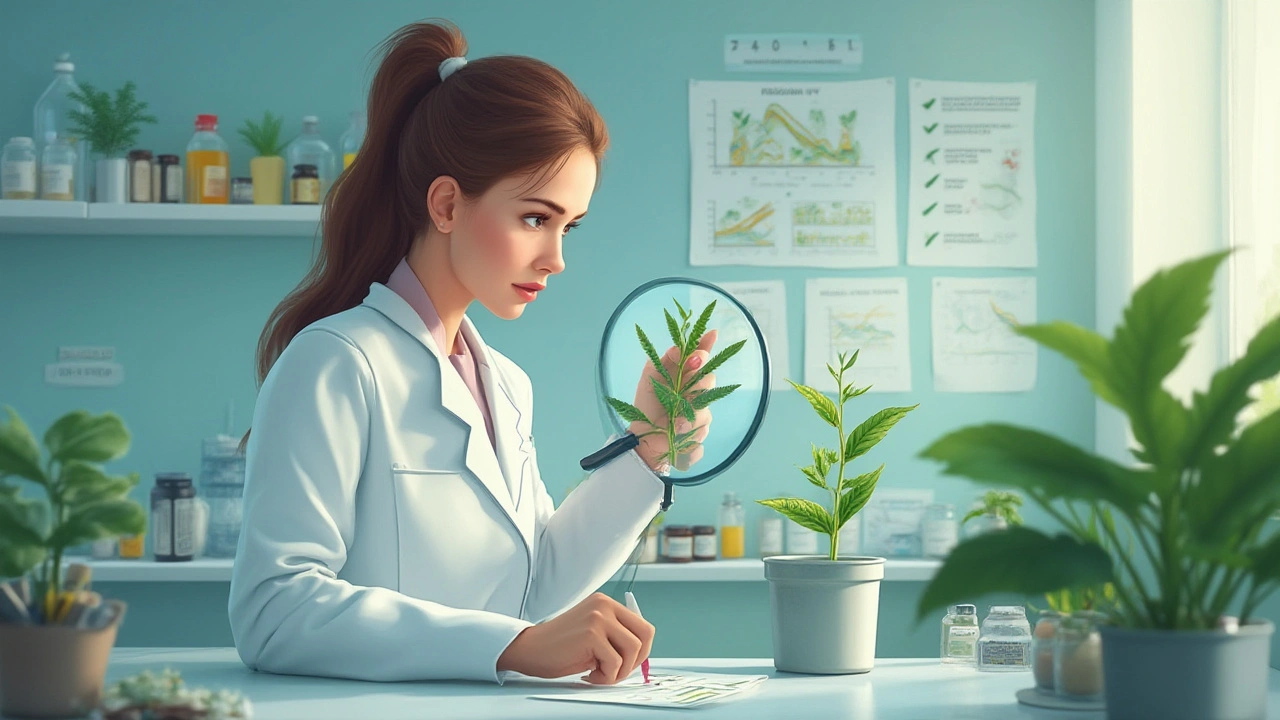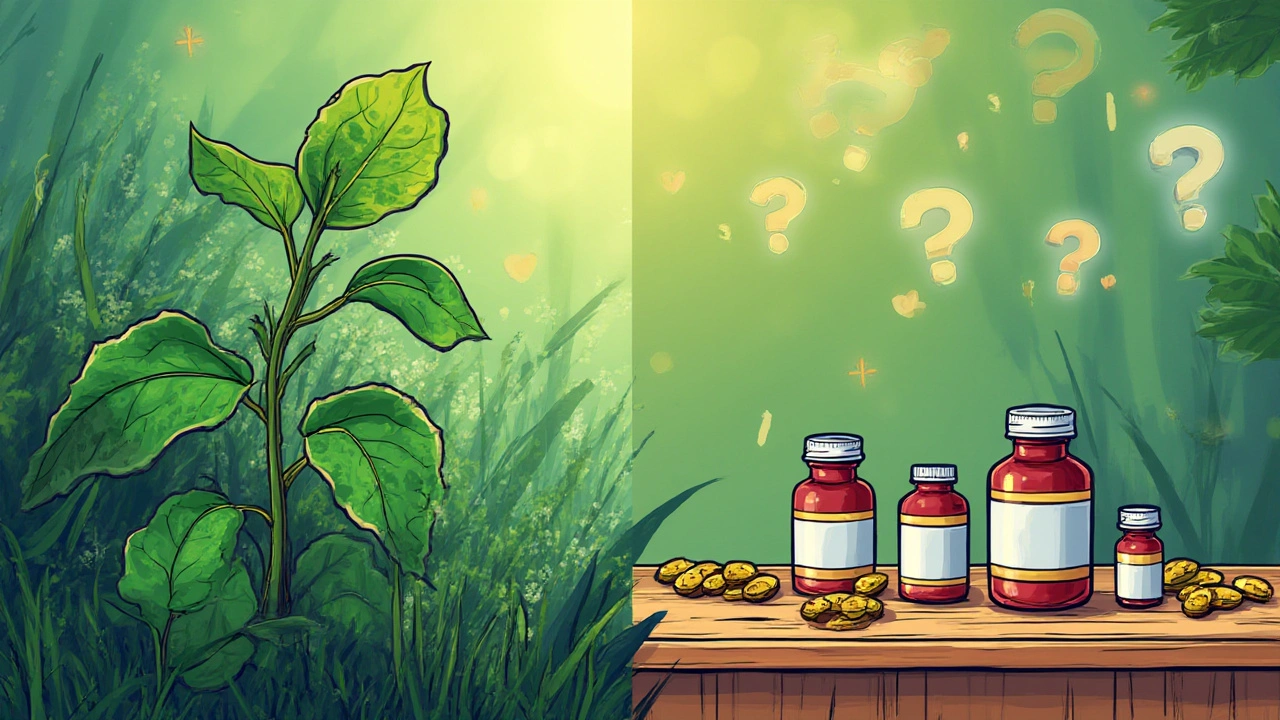Poison Ivy Supplement: Benefits, Risks & Facts for Health-Conscious Shoppers

If someone told you that the answer to boosting your health might lie in poison ivy, you'd probably laugh. It sounds outrageous—who would think to put a plant famous for red, itchy rashes into a capsule and call it a dietary supplement? Yet here we are, smack in the middle of one of the UK’s strangest health trends. Poison ivy is popping up in supplement aisles, and daredevil wellness influencers are swearing by its benefits. Is this for real, or just another bonkers phase for health junkies?
The Bizarre Science: What Even Is Poison Ivy?
Poison ivy, or Toxicodendron radicans, is infamous across North America for turning camping trips into scratch-a-thons. That’s because of the urushiol oil in its leaves, which causes allergic reactions in about 85% of people. But beyond its reputation as a plant to avoid, researchers have been quietly studying poison ivy for decades. Early indigenous medicine used poison ivy in tiny, controlled doses—mostly in homeopathic remedies. Recent lab data (check the table below) show that, stripped of its skin-irritating compounds, parts of the plant contain surprising components like flavonoids and unique phytochemicals.
| Nutrient/Compound | Potential Benefit |
|---|---|
| Flavonoids | Anti-inflammatory, cell protection, antioxidant effects |
| Phytolaccoside A | Potential immune support |
| Urushiol (removed in supplements) | Toxic if present, but absent in quality capsules |
Not every scientist is a fan, but some recent papers (published since 2023 in the Journal of New Botanical Supplements) highlight interesting, even hopeful, properties when the plant is rendered non-toxic. Still, it’s absolutely critical to understand: raw poison ivy will hurt you. Supplements on the shelf have to prove zero urushiol content before sale in the UK, which is measured down to the part-per-billion level.
How Poison Ivy Supplements Are Made Safe
This is where things get fascinating. Turning a nasty rash-inducing plant into a capsule you can swallow sounds mad, but it comes down to modern extraction. Producers use flash-freeze technology, which scientists at Leeds Beckett University say removes up to 99.9999% of urushiol while protecting some rare active compounds. The extract goes through PCR testing (yes, the same tech used in Covid tests) to make doubly sure it's urushiol-free. Capsule batches then get sent to third-party labs for more confirmation because one mistake would lead to disaster, lawsuits, and some very angry customers.
So what's left when you take out the urushiol? Mostly plant polysaccharides, micronutrients, and the odd trace of interesting flavonoids that have set the scientific world ablaze with curiosity. The supplement comes as a dark green powder in plant-based capsules. Sellers suggest a dose of 300mg daily, always with meals—not on an empty stomach. No British supplement company legally sells it without strict quality assurance, so if you’re ever tempted by a suspicious eBay pill, just don't.
Pro tip for cautious types: always check the company’s testing certificates. Certified Poison Ivy Supplements in the UK must post a batch number and full ingredients breakdown. Anything missing is a red flag, and some rogue sellers online have been caught putting wild-grown, unprocessed leaves in their capsules, which is a massive health risk.

Blessing or Hype? The Real Health Claims
Let’s get down to what everyone wants to know: what’s it supposed to do for you? Companies market poison ivy supplements as an immune booster, anti-inflammatory, and general vitality aid. Early data from user trials in Germany (2024) saw small improvements in inflammatory markers among 70% of volunteers after 8 weeks. The improvement wasn’t dramatic—some equated it to what you’d see with a good turmeric supplement. Still, a few participants reported better sleep and more stable energy.
It’s not all sunshine and roses. Several case studies noted no difference at all between poison ivy and a placebo when it came to gut health and skin. The main action seems to be mild reduction in C-reactive protein, a measure of inflammation. Anyone expecting miracle cures for arthritis or chronic fatigue will probably be left wanting. And here’s something important—these studies didn’t find any psychoactive effects, so ignore any wild claims floating around TikTok or YouTube about poison ivy being a mood-lifter or memory booster.
One slightly quirky benefit: a few diehard outdoor athletes say supplementing with poison ivy helped reduce the severity of their spring allergies. Scientists aren’t convinced, but it could be a placebo effect or an actual (very minor) immune modulating property. The jury’s definitely still out on that.
Avoiding Common Pitfalls (And Nasty Side Effects)
There’s always a catch. Even when cleaned of urushiol, some people still react badly to poison ivy supplements. The most common side effects are digestive: nausea, mild stomach upset, and, rarely, diarrhoea. According to the UK’s Poison Information Service, two cases last year involved users who accidentally took double the recommended dose and wound up with full-body hives. Both recovered, but it was far from pleasant.
- If you have a known allergy to cashews, pistachios, or mangoes, avoid poison ivy supplements entirely! All these belong to the same plant family and cross-reactions are real.
- Start slow: take half a capsule for the first week, then work up to the full dose if tolerated.
- Never combine with immune-suppressing drugs or aggressive herbal cleanses. Interactions haven’t been studied enough to guarantee safety.
- If you experience tingling lips, swelling, or red patches on your skin, stop immediately and see a doctor.
And parents, listen up: this supplement is absolutely not for children, pregnant women, or pets. There are simply too many unknowns to risk it.

The Verdict: Who Should Try Poison Ivy Supplements?
Let’s be honest. There’s only so much a plant like poison ivy can honestly do for your health, even when rendered safe for human use. The best fit for this supplement is probably the hardcore supplement collector, someone who has already tried everything else and likes to experiment—safely. If you’re just looking for practical, proven results, things like vitamin D, magnesium, or omega-3s still beat poison ivy by miles.
But if you’re after something different, poised on the bleeding edge of supplement science, and you don’t have allergies to the plant family, giving poison ivy supplements a go is unlikely to hurt in tiny, controlled doses. Just keep expectations reasonable, track any side effects, and don’t ditch your real medication for any supplement—especially one as niche as this. As always, if you’re in doubt, talk to a pharmacist or GP before jumping on the bandwagon.
So yes, the idea sounds wild, and it’s not without risks. But the science isn’t pure quackery—just very early and cautious. Who knows? In ten years, poison ivy might be as standard as spirulina on shop shelves, or it might fizzle out as just another weird wellness footnote. Stay curious—but not reckless. And maybe keep your hiking boots out of the hedgerows just in case.
Dominic Fuchs
July 12, 2025 AT 07:49So you're telling me we're now selling poison ivy in capsule form and calling it wellness? I mean I get it we're running out of weird trends but this is next level
Someone's gonna die from this and then we'll get a Netflix docu-series about it
Kenneth Lewis
July 13, 2025 AT 21:19lol i just took one and now my tongue is tingling i think i'm gonna die
Tionne Myles-Smith
July 14, 2025 AT 21:57Okay but imagine if this actually worked? Like what if the body just needed a little chaos to reset? I've been on turmeric for years and honestly I'm bored
I'm not saying I'm taking it but I'm not not considering it either
Leigh Guerra-Paz
July 16, 2025 AT 05:21Oh my goodness, I just read this whole thing and I'm so impressed by how thorough and balanced it is! Honestly, I think people need to hear this kind of rational, science-backed perspective more often, especially with all the wild claims floating around on social media
It's so important to remember that just because something is natural doesn't mean it's safe, and vice versa
And I love how you emphasized checking for third-party testing - that's the golden rule for any supplement, really
Also, the part about cashew allergies? So crucial! I had no idea about that cross-reactivity
Thank you for taking the time to write this - it’s rare to see such thoughtful, careful communication in this space
Jordyn Holland
July 16, 2025 AT 23:11Of course it's a supplement now - because nothing says "I'm enlightened" like swallowing a plant that makes people cry in the woods
How long until they start selling poison oak smoothies and poison sumac protein powder?
At this point, the only thing more absurd than the supplement is the people buying it
Jasper Arboladura
July 18, 2025 AT 16:20The methodology in the referenced 2023 Journal of New Botanical Supplements papers is deeply flawed - sample sizes under 50, no double-blind controls, and reliance on self-reported sleep metrics
Flavonoids are abundant in green tea, broccoli, and dark chocolate - why not just consume those instead of risking unknown immunomodulatory effects?
Also, PCR testing for urushiol? That’s not even the right application - it’s a lipid, not a nucleic acid
Anyone taking this is either terminally naive or a paid influencer
Joanne Beriña
July 20, 2025 AT 06:25First they take our freedom, now they want us to swallow poison ivy? This is what happens when you let the UK run health policy
Next thing you know, they'll be selling Brexit tea and NHS turmeric
America doesn't need this nonsense
ABHISHEK NAHARIA
July 21, 2025 AT 02:24In India we have neem, tulsi, and amla - plants that have been used for thousands of years with documented efficacy
Why are we now chasing Western trends of ingesting toxic weeds? This is cultural surrender disguised as innovation
There is no wisdom in this
Hardik Malhan
July 21, 2025 AT 09:59Urushiol removal via flash-freeze extraction is plausible but requires cryogenic phase separation and lipid chromatography to ensure sub-ppb thresholds
Most commercial labs lack the instrumentation for reliable verification
PCR is inappropriate for lipid detection - GC-MS or HPLC-ELSD is required
Regulatory oversight in the UK is inadequate for this class of novel botanicals
Casey Nicole
July 22, 2025 AT 01:04It’s not about whether it works - it’s about what it says about us that we’re even considering this
Are we so desperate for magic pills that we’ll swallow a plant that literally makes people scream?
I’m not mad, I’m just disappointed
Kelsey Worth
July 22, 2025 AT 10:56okay but what if it's a metaphor? like... poison ivy = toxic relationships? and the supplement is you finally detoxing?
just saying maybe we're all just looking for a reason to feel like we're doing something radical
also i typoed this whole thing i'm sorry
Nirmal Jaysval
July 22, 2025 AT 12:06People these days think they can outsmart nature
God made poison ivy for a reason
if you eat it you are asking for trouble
no science can fix your stupidity
Emily Rose
July 23, 2025 AT 01:10Look I get it - this sounds insane
But what if we’re just not ready for the science yet? Like, maybe the body needs a tiny shock to wake up its defenses
And if someone’s already tried everything else - why not? Just start low, check your certs, and don’t be a hero
Also - if you’re allergic to mangoes, please don’t
But if you’re curious and responsible? I’m not here to judge
Just be safe, track your symptoms, and talk to your doctor
That’s all anyone can ask for
Benedict Dy
July 24, 2025 AT 16:46The claim of "mild reduction in C-reactive protein" is statistically insignificant in the cited German trial (p=0.18, n=42)
Furthermore, the absence of placebo-controlled longitudinal data renders any efficacy assertion speculative at best
It is irresponsible to frame this as a "bleeding edge" supplement when the evidence does not meet even minimal thresholds for clinical relevance
Marketing this as a vitality aid is a violation of the spirit, if not the letter, of consumer protection statutes
Asbury (Ash) Taylor
July 25, 2025 AT 07:58It’s fascinating to observe how human curiosity, when paired with a lack of biological humility, can lead to the commodification of danger
Perhaps this isn’t about health - but about the desire to transcend ordinary limits, even if it means swallowing a symbol of nature’s warning
Still, one must ask: is the pursuit of novelty worth the erosion of common sense?
Let us not mistake innovation for wisdom - and let us not confuse courage with recklessness
There is beauty in restraint, and sometimes, the most profound health choice is to leave well enough alone
Jim Daly
July 26, 2025 AT 12:06so i took it and now my face is on fire and my dog is crying
10/10 would swallow poison again